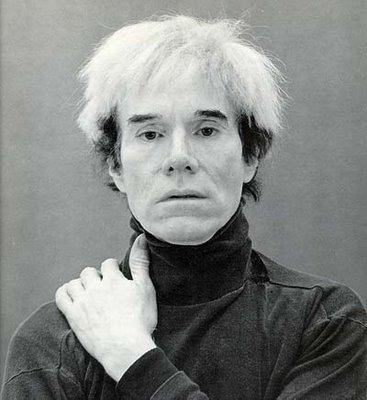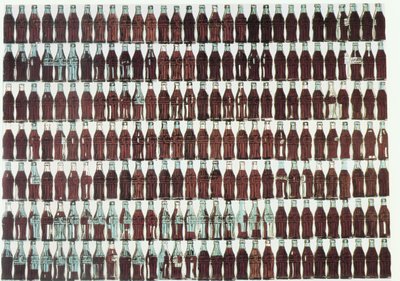 Any week-long series of posts addressing Pop Art must make mention of the famous American artist and filmmaker Andy Warhol (1928-1987). Warhol was born to Rusyn immigrant parents in Pittsburgh. He studied commercial art at Carnegie Mellon University before moving to New York City to become a commercial illustrator. During the 1960s, he launched to fame through his paintings of popular American products, such as Campbell's Soup and celebrities, such as Marilyn Monroe and Elizabeth Taylor. He founded "The Factory", a studio complex, which became the heart of the avant-garde NYC scene, all centered around Warhol's radiating celebrityhood and his entourage of artists, writers, and musicians. One of them, a mentally ill writer, shot him in 1968.
Any week-long series of posts addressing Pop Art must make mention of the famous American artist and filmmaker Andy Warhol (1928-1987). Warhol was born to Rusyn immigrant parents in Pittsburgh. He studied commercial art at Carnegie Mellon University before moving to New York City to become a commercial illustrator. During the 1960s, he launched to fame through his paintings of popular American products, such as Campbell's Soup and celebrities, such as Marilyn Monroe and Elizabeth Taylor. He founded "The Factory", a studio complex, which became the heart of the avant-garde NYC scene, all centered around Warhol's radiating celebrityhood and his entourage of artists, writers, and musicians. One of them, a mentally ill writer, shot him in 1968.Warhol never fully recovered from these injuries, and the remaining two decades of Warhol's life were spent in increasingly commercial endeavors. He successfully predicted the rise of Neo-Expressionism in the 1980s and invested accordingly, becoming very wealthy. Weakened by complications of gallbladder surgery, he died in his sleep 1988.
 210 Coca Cola Bottles (1962) from the Daros Collection.
210 Coca Cola Bottles (1962) from the Daros Collection.As a Christian and especially as a seminarian, I hear consumerism under constant attack. This is mostly sound when it attacks excess, but foolish when it advocates poverty; that is, consumerism sounds terrible to those who are fabulously wealthy and can afford such blather. But to the poorest in the world, the idea of having mass-produced food, clothing, and medicine (all elements of consumerist economies) is wonderful. I've yet to hear someone who lives in a house with a dirt floor attack consumerism.
In a similar vein, Andy Warhol saw consumerism as a leveling force in capitalist society:
What's great about this country is that America started the tradition where the richest consumers buy essentially the same things as the poorest. You can be watching TV and see Coca-Cola, and you know that the President drinks Coke, Liz Taylor drinks Coke, and just think, you can drink Coke, too. A Coke is a Coke and no amount of money can get you a better Coke than the one the bum on the corner is drinking. All the Cokes are the same and all the Cokes are good. Liz Taylor knows it, the President knows it, the bum knows it, and you know it.
This week, I've disciplined myself to learn about an artistic movement that I knew nothing about. I was very skeptical at first because of what I perceived as a lack of technical artistic skill among its practitioners of the variety unmistakably present in Academic art. And it is truly possible that a creator of modern art forms may be able to hide a lack of technical talent behind pretended profundity. And in spite of my desire to be open-minded and not languish in Academicist provincialism, I insist that technical skill must play some role in discerning art from non-art. An artist must be capable of replicating in physical form the vision within his mind instead of shaping his vision to fit limited technical abilities. Bouguereau could create an Indiana if he so desired; Indiana could not create a Bouguereau in his wildest dreams.
But I must nonetheless express admiration for the Pop Artists. I may be misreading their movement through ignorance (I am not an art historian by any stretch), but I see in their works a vigorous defense of capitalism -- that art (and everything else) need not be restricted to the elites, but possessed by the masses. This is the beauty of capitalism: it is not perfect, but does the most good for the most number of people.

3 comments:
I remember in elementary school, upon learning that Warhol stacked soup cans and sold them as art, i was horrified. I thought at the time that that should clearly be illegal. But later, (i forget exactly when) i changed my view and thought "well if someone is stupid enough to pay too much for that, then well, thats their fault."
Look on the bright side: because technical talent is no longer so important, you and I can become commercially successful artists!
He has a huge legacy to today's fashion world. On www.yogoego.com they are selling famous art such as soup cans on t-shirts and are getting sold daily!! He will be known in every generation because of the pop art he created! I say good on him!!!
Post a Comment